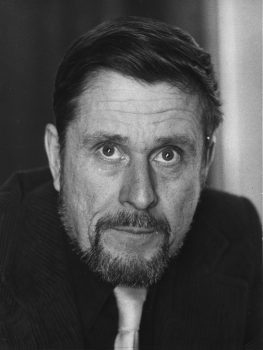Tag: travel
Blowing in the wind
26 November 2010 | Reviews
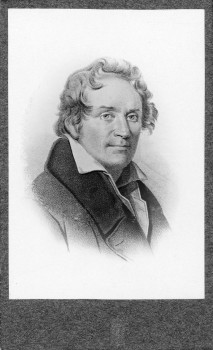
Clarinettist who travelled: Bernhard Crusell
Bernhard Crusell: Keski-Euroopan matkapäiväkirjat 1803–1822
[Bernhard Crusell: Travel Diaries from Central Europe, 1803–1822]
Suom. ja toim. [Translated into Finnish and edited by] Janne Koskinen
Helsinki: Suomalaisen kirjallisuuden seura [Finnish Literature Society], 271 p., ill.
ISBN 978-952-222-090-5
€28, hardback
Born the son of a poor bookbinder on the west coast of Finland, Bernhard Crusell (1775–1838) had talents as a clarinettist and composer that brought him considerable fame, both in his native country and further afield. Hannu Marttila reads the diaries he wrote on his travels in Europe, where his meetings with the great and the good chart the emergence of the new Romantic sensibility
‘Felix is a most beautiful child, and he is also said to be very unassuming. In his compositions one immediately recognises the signs of genius and good training. He continues to study under Zelter, and, thanks to an anticipated large inheritance, he, too, may become an independent composer. People here think he may even become another Mozart.’ More…
Postcards from the lakeside
8 August 2010 | This 'n' that
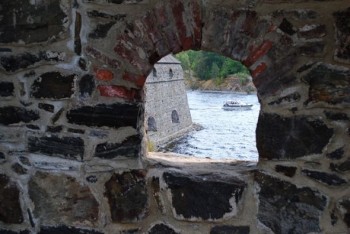
A tower with a view: Olavinlinna (St Olaf's castle). Photo: Lola Rogers
Translator Lola Rogers (of, for example, Sofi Oksanen’s best-selling novel Purge), from Seattle, spent a few weeks in Finland, and went on a cruise on Lake Saimaa.
Olavinlinna (St Olaf’s castle), and the opera, in the city of Savonlinna, was one of her stops; take a look at her blog – you’ll perhaps recognise the the inventive 16th-century wall privies on the towers we wrote about a while ago.
There are quite a few photos from Helsinki, too – from this hot, hot (too hot?) summer.
Matti Rämö: Polkupyörällä Intiassa. Lehmiä, jumalia ja maantiepölyä [Cycling in India. Cows, gods, and road dust]
30 July 2010 | Mini reviews, Reviews
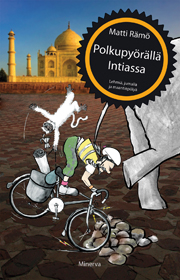 Polkupyörällä Intiassa. Lehmiä, jumalia ja maantiepölyä
Polkupyörällä Intiassa. Lehmiä, jumalia ja maantiepölyä
[Cycling in India. Cows, gods, and road dust]
Helsinki: Minerva Kustannus Oy, 2010. 301 p., ill.
ISBN 978-952-492-335-4
€ 27.90, hardback
The author decides to take a pinch of the ashes of his dead mother to India’s Varanasi, the city of pilgrims on the banks of the Ganges, and at the same time visit his daughter at an international high school on the country’s west coast. Rämö takes his bicycle on the plane to Delhi and in the course of a month cycles more than 2,600 kilometres, from Delhi to Mumbai. The cyclist is challenged by the heat and humidity, the chaotic traffic, the awkward sections of road and the endless thirst for knowledge on the part of curious bystanders – but his observations are deeper than those of the average travel author, as he worked in India in third world research during the 1980s and 1990s. In the summer of 2007 he completed a four months’ cycle tour of the Sahara, travelling some 9,600 kilometres, and published a book about his experiences (Rengasrikkoja Saharassa, ‘Punctures in the Sahara’, Minerva, 2008). In spite of the shorter length of the Indian journey, the author thinks it possessed a higher difficulty factor.
Need to go?
23 June 2010 | This 'n' that
 No traveller can avoid toilets, as the internet service about.com (run by the company that owns the New York Times) points out on its Scandinavia travel website.
No traveller can avoid toilets, as the internet service about.com (run by the company that owns the New York Times) points out on its Scandinavia travel website.
Thus, it may be reassuring to know that ‘the days of outhouses are numbered’, and in Finland there are no squat toilets, according to the experiences of the editor, Terri Mapes. (The concept of ‘Finlandic restrooms’, however, is a new one to us – as is, for that matter, the adjective ‘Finlandic’.)
However, under the title ‘Bad Things About Toilets in Finland’ you’ll be informed about the possibility of outhouses without running water, should you choose the option of wandering into the wildernesses. And as toilets at airports or train stations may occasionally smell bad, it is advisable to use the bathroom at your hotel, unless your needs are urgent of course. More…
Erkki Lampén: Neljä retkeä läpi Suomen [Four trips across Finland]
15 March 2010 | Mini reviews, Reviews
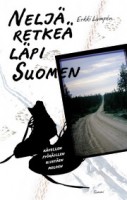 Neljä retkeä läpi Suomen. Kävellen – pyöräillen – hiihtäen – meloen
Neljä retkeä läpi Suomen. Kävellen – pyöräillen – hiihtäen – meloen
[Four trips across Finland. On foot – by bicycle – on skis – by kayak]
Helsinki: Tammi, 2009. 272 p., ill.
ISBN 978-951-31-4988-8
€ 25, hardback
In the spring of 2000, a downbeat 40-year-old man sat musing on the meaning of life when an idea suddenly came to him: why not walk from Helsinki to the Arctic Ocean? In his diary of this trek, which covered more than seven weeks and over a thousand kilometres, the journalist and writer Erkki Lampén describes the landscape, people, events and his own thoughts along the journey. Lampén made another three journeys (in 2003, 2004 and 2006) travelling by bicycle, on skis and by kayak, sleeping in a tent, in rustic cabins, in motels and hotels. His circular cycle journey aimed to follow Finland’s national borders as closely as possible; on skis he covered the distance from Porvoo on the south coast to Utsjoki in the far north; he then paddled his kayak from Lapland to the Gulf of Finland (this journey required plenty of wheeling the vessel from one river or lake to another). Lampén’s diary entries convey an entertaining blend of a realistic battle for survival, philosophising, joy, fury and humour.
Teemu Kupiainen & Stefan Bremer
Music on the go
3 March 2010 | Extracts, Non-fiction
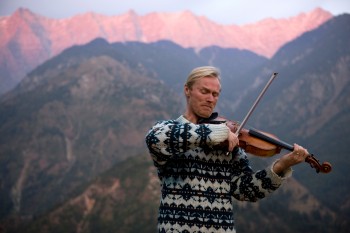
A little night music: Teemu Kupiainen playing in Baddi, India, as the sun sets. Photo: Stefan Bremer (2009)
It was viola player Teemu Kupiainen‘s desire to play Bach on the streets that took him to Dharamsala, Paris, Chengdu, Tetouan and Lourdes. Bach makes him feel he is in the right place at the right time – and playing Bach can be appreciated equally by educated westerners, goatherds, monkeys and street children, he claims. In these extracts from his book Viulun-soittaja kadulla (‘Fiddler on the route’, Teos, 2010; photographs by Stefan Bremer) he describes his trip to northern India in 2004.
In 2002 I was awarded a state artist’s grant lasting two years. My plan was to perform Bach’s music on the streets in a variety of different cultural settings. My grant awoke amusement in musical circles around the world: ‘So, you really do have the Ministry of Silly Walks in Finland?’ a lot of people asked me, in reference to Monty Python. More…
Breton without tears
Issue 1/1994 | Archives online, Fiction, Prose
Extracts from Euroopan reuna (‘The edge of Europe’, Otava, 1982). Introduction by H. K. Riikonen
I am reading a book, it says pour l’homme latin ou grec, un forme correspond à un être; pour le Celte, tout est metamorphose, un même individu peut prendre des apparences diverses, so it says in the book. A strange claim, considering that the word metamorphosis is Greek, and that the best-known book about metamorphoses, Ovid’s Metamorphoseon libri XV was written in Latin. In the myths of all peoples, at least the ones whose oral poetry was recorded in time, such as the Greeks, Serbs, Slavs, Finns, or Aztecs, metamorphoses play a very important part, the Celts are not an exceptional tribe in this respect. The author must mean that the Celts still live in mythical time, the time of metamorphoses when the human being assumed shapes, was able to fly as a bird, swim as a fish, howl as a wolf, and to crown his career by rising up into the sky as a constellation. Brittany is part of the Armorica Joyce tells us about in Finnegans Wake, that book is incomprehensible if one does not know Ireland, and now I see that Brittany is the key to one of the book’s locked rooms. I thought I already had keys to all the rooms after Dublin, the Vatican, and Athens, but one door was and remained closed, the key is here now, in my hand, I can get into all the rooms in the book, and I am home even if I should happen to get lost. The room creates the person, she becomes another when she goes from one room to another, this is metamorphosis, and when she leaves the house she disappears, she no longer exists. The legend on the temple at Delphi, gnothi seauton, know thyself, has led Occidentals onto the false track that is now becoming a dead end, polytheistic religions correspond to the order of nature, but as soon as the human starts to imagine that she knows herself, as soon as the metamorphic era ends, monotheism is born, the human being creates god in her own image, and that is the source of all evil. Planted like traffic signs at the far end of this cul-de-sac stand the hitlers and brezhnevs and reagans and thatchers, new leaves are appearing on the trees, the sun is shining. Landet som icke är* är en paradox: landet blev befintligt därigenom att Edith Södergran sade att det icke är. On the sea sailed a silent ship*, as I tracked my shoeprints across the sand on the beach, it was like walking on a street made out of salty raw sugar, I felt desolate. The wind bent the grasses, the sun warmed the back of my sweater, of course the sun always has the last word, I thought, things should be as they are, this thought gave me peace of mind. I walked past the cows, two of them already chewing the cud, the others still grazing, they stood in a line and raised their heads, stood at attention, as it were, as I walked past. I was not entirely sure that I was heading in the right direction, but then I saw the boucherie and knew that there was a café nearby. Madame greeted me in a friendly fashion, brought me a calvados and a beer and sat down for a chat, wanted to know if I liked the countryside here. I said that things looked the same here as in Ireland, she said that was true, but she had never been to Ireland. I finished my drinks and paid, left, decided to walk along the beach. I saw gun emplacements and two bunkers. I crawled into a bunker. Inside, it was dark and damp. I looked through the embrasure at the sea. I thought of the boys who had been incarcerated here. They had been given a death sentence. I examined a rusty object, what was it, I looked at it more closely, it was an axle from a gun’s undercarriage. As I arrive in my home yard, I note that the lilacs are beginning to bloom. More…
Across Europe
Issue 2/1990 | Archives online, Fiction, Prose
Mika Waltari (1908–1979) was a prolific writer, journalist and translator. In addition to historical novels, he wrote short stories, travel books, thrillers, plays, books for children, film scripts and poetry. The newly independent Finland of the 1920s, as it emerged from a traumatic period of civil war, declared that its windows were open to Europe, and Waltari’s first novel Suuri illusioni (‘The great illusion’), written in Paris when he was only 19, represents urban romanticism and the world of European capitals.The optimism and enthusiasm for modern life of the 1920s are strongly present in Waltari’s travelogue, Yksinäisen miehen juna, (‘Lonely man’s train’; 1929), an account, both ironic and engagingly naïve, of a great adventure in Europe after the post-1918 redrawing of the continent’s map. The book’s motto is a phrase from Paul Morand, a writer Waltari admired: ‘How is it possible to remain stationary when time slips like ice through our hot hands.’ This work of Waltari’s youth has never before been translated. The author travels by ship and train as far as Turkey; in the following extract, he has reached Hungary
Yksinäisen miehen juna (‘Lonely Man’s train’)
How adorable express trains are – the mighty engines, the rhythm of the rails, the sway of the carriages, the flashing-by of the milestones, the gravel embankments contracting into speeding lines. A train is the only place you can be completely at ease, free from heartache, free from longing, free from tormenting thoughts. Whenever I die, I hope it will be on a train flashing towards some unknown town at eighty miles an hour, with mountains looming on the horizon, and the points lighting up in the descending dusk…. More…
Among the ice floes
Issue 3/1985 | Archives online, Fiction, Prose
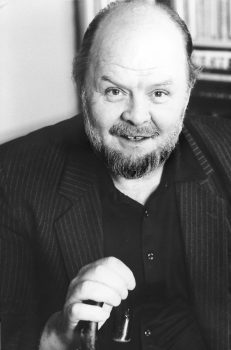
Alpo Ruuth. Photo: Sakari Majantie / Tammi
Alpo Ruuth came across the diary of a member of the Finnish crew of ten men in the Whitbread Round-the-World sailboat race of 1981-1982, and Ruuth, a sailor himself, used that diary as the basis for his novel, 158 vuorokautta (‘158 days’, 1983). It is the story of a great adventure which takes place with the help of ultra-modern equipment and yet involves confrontation with elemental nature, the dangerous power of the southern seas. Ruuth does not use the actual names of the crew, but has taken the view of the fictional crew member who is able to offer ironic comments on what he observes. The book portrays the relationships among the crew under the cramped and difficult conditions of the long voyage. As the extract begins the yacht is in the Southern Ocean, close to the Antarctic coast, making its way towards Auckland, New Zealand.
An extract from 158 vuorokautta (‘158 days’)
Around noon we run into a blizzard. On deck they shout down that a wind has got up. Below, we wake hurriedly from our afternoon naps and start pulling on clothes against the tough weather outside. It’s quite a business in our cramped quarters, and every now and then someone loses his footing and falls as the boat pitches. Cursing is the only medicine for bruises. One by one the boys go up to help change sails; at the bottom of the steps there are excesses of politeness: after you, sir; no no, after you. Up they go, all the same. More…

